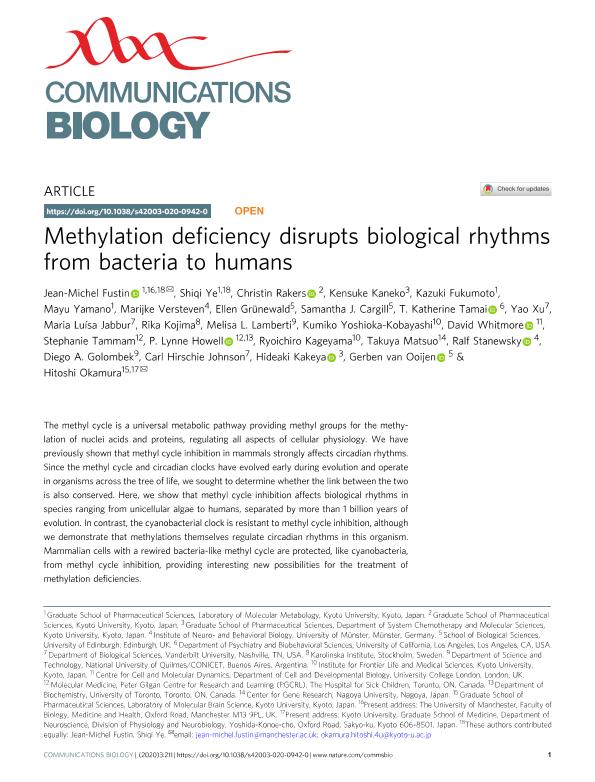Artículo
Methylation deficiency disrupts biological rhythms from bacteria to humans
Fustin, Jean Michel; Ye, Shiqi; Rakers, Christin; Kaneko, Kensuke; Fukumoto, Kazuki; Yamano, Mayu; Versteven, Marijke; Grünewald, Ellen; Cargill, Samantha J.; Tamai, T. Katherine; Xu, Yao; Jabbur, Maria Luísa; Kojima, Rika; Lamberti, Melisa Luciana ; Yoshioka Kobayashi, Kumiko; Whitmore, David; Tammam, Stephanie; Howell, P. Lynne; Kageyama, Ryoichiro; Matsuo, Takuya; Stanewsky, Ralf; Golombek, Diego Andrés
; Yoshioka Kobayashi, Kumiko; Whitmore, David; Tammam, Stephanie; Howell, P. Lynne; Kageyama, Ryoichiro; Matsuo, Takuya; Stanewsky, Ralf; Golombek, Diego Andrés ; Johnson, Carl Hirschie; Kakeya, Hideaki; Van Ooijen, Gerben; Okamura, Hitoshi
; Johnson, Carl Hirschie; Kakeya, Hideaki; Van Ooijen, Gerben; Okamura, Hitoshi
 ; Yoshioka Kobayashi, Kumiko; Whitmore, David; Tammam, Stephanie; Howell, P. Lynne; Kageyama, Ryoichiro; Matsuo, Takuya; Stanewsky, Ralf; Golombek, Diego Andrés
; Yoshioka Kobayashi, Kumiko; Whitmore, David; Tammam, Stephanie; Howell, P. Lynne; Kageyama, Ryoichiro; Matsuo, Takuya; Stanewsky, Ralf; Golombek, Diego Andrés ; Johnson, Carl Hirschie; Kakeya, Hideaki; Van Ooijen, Gerben; Okamura, Hitoshi
; Johnson, Carl Hirschie; Kakeya, Hideaki; Van Ooijen, Gerben; Okamura, Hitoshi
Fecha de publicación:
06/2020
Editorial:
Springer
Revista:
Communications biology
e-ISSN:
2399-3642
Idioma:
Inglés
Tipo de recurso:
Artículo publicado
Clasificación temática:
Resumen
The methyl cycle is a universal metabolic pathway providing methyl groups for the methylation of nuclei acids and proteins, regulating all aspects of cellular physiology. We have previously shown that methyl cycle inhibition in mammals strongly affects circadian rhythms. Since the methyl cycle and circadian clocks have evolved early during evolution and operate in organisms across the tree of life, we sought to determine whether the link between the two is also conserved. Here, we show that methyl cycle inhibition affects biological rhythms in species ranging from unicellular algae to humans, separated by more than 1 billion years of evolution. In contrast, the cyanobacterial clock is resistant to methyl cycle inhibition, although we demonstrate that methylations themselves regulate circadian rhythms in this organism. Mammalian cells with a rewired bacteria-like methyl cycle are protected, like cyanobacteria, from methyl cycle inhibition, providing interesting new possibilities for the treatment of methylation deficiencies.
Palabras clave:
Circadian rhythms
,
Evolution
,
Metabolism
,
Methylation
Archivos asociados
Licencia
Identificadores
Colecciones
Articulos(SEDE CENTRAL)
Articulos de SEDE CENTRAL
Articulos de SEDE CENTRAL
Citación
Fustin, Jean Michel; Ye, Shiqi; Rakers, Christin; Kaneko, Kensuke; Fukumoto, Kazuki; et al.; Methylation deficiency disrupts biological rhythms from bacteria to humans; Springer; Communications biology; 3; 1; 6-2020; 1-14
Compartir
Altmétricas



